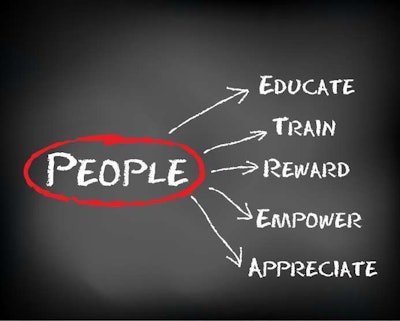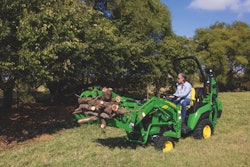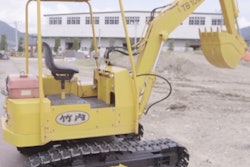
There are thousands of solo landscapers around. My uncle Todd has been operating that way for over 15 years now. He has no intention to hire employees, but many solo operators do. The ability to do more work, make more money and perhaps spend more time in the office than the field makes hiring sound appealing.
The rest of us already have employees, and understand that hiring employees has plenty of benefits and (at least) as many challenges. On an industry community board, one company owner recently lamented that if his company were named honestly it wouldn’t be “Xyz Landscaping,” but “Xyz Babysitting.” No one participating in the thread disagreed.
At Ross NW Watergardens, my dad and I have always had the goal of having our cake and eating it too. In this case, “cake” = employees and “eating it” = keeping our principles and sanity intact. We are both pretty laid back and naturally want to trust the people we work with. Can you manage employees that way and not be taken advantage of? Yes, with an asterisk.
We have had the employee who steals. More than one, actually. Some steal time, some steal fertilizer or tools and one of ours stole baby shoes off a porch. My mom has still not forgiven him.
We have had the employee who just doesn’t show up. When they have a company truck and go AWOL? That’s tough.
We have had the employee who quits without warning. One had his wife call and beg for a second chance. He was given one and then quit again, in a huff, with no warning. Yet, they list me as a reference for jobs, apartments and loans. Really?
These employees are a small (but frustrating) minority. We have a long track record of cultivating valuable employees. The vast majority of our employees have been diligent and loyal. Our landscape construction crew leaders have an average of 11 years with us. One even turned down a job offer that would have paid him more than we will ever be able to. All of this is despite the fact that we are too small to offer many (any?) traditional benefits.
How have we done it? By following some basic principles. While certainly not covering everything that goes into managing our team, here are five that I believe play a big role:
1. Respect
We treat our employees as equals from day one. There is no probationary period. They don’t have to earn it. Expecting someone to excel increases the chances they will. Try assuming a new employee will be a great fit. Some will certainly prove you wrong, but most won’t.
2. Put people in the right places
A group of employees can be viewed like puzzle pieces. For them to work, each has to be in the right place. Resist the urge to ask an employee to do more than they are capable of just because the company has a need. You will both end up disappointed, and it won’t be the employee’s fault. For example, during a slow period a few years ago, we found a spot at another landscaping company for one of our employees. The employee is very skilled, but (and we made this clear to the other owner) he was not ready to be a crew leader. What did the owner do? Yep, he made him a crew leader. It lasted about six months and then ended badly. We were able to rehire him, continue his training and eventually he did become a crew leader. Don’t ruin an employee by setting them up to fail.
3. Commendation
There is no way around it. As an employer, you have to give correction, suggestions and sometimes even discipline. There is no way to avoid all tough conversations or confrontation. If you are like me, you step out of your truck and immediately see 10 things – major and minor – that need to be fixed on a project. It’s my job to get these corrected. But as Mary Poppins said, “A spoonful of sugar makes the medicine go down.” Start by pointing out something positive. Then, deal with the items that need fixed. If you commend more than you correct, your employees are not likely to chafe under your direction. Complementing your employee in front of a client is especially motivating.
4. Flexibility is a benefit
We may not offer healthcare or have an on-site barista, but a flexible schedule is seen as a huge benefit by many employees. Can you find a way to offer some flexibility to your employees? Our landscape construction crews set their own start and finish times, and it varies from day to day. The maintenance crews know that certain properties have to be serviced on certain days, but are allowed to structure the route as they want. Our crew leaders know that my family is my top priority, and we allow them to do the same. They can miss work with no notice to care for a sick child or other family issue. Side work is important to our crew leaders, so we let them take three- or even four-day weekends as needed. We even let them take afternoons off for World Cup matches. There is no denying that this flexibility sometimes makes us less efficient. But, for us, it’s a low price to pay to keep skilled craftsmen loyal year after year.
5. Collaborate
Function as a team of equals, not “management” and “labor.” When issues come up, we don’t give orders, we have a discussion. For example, a recent client was worried about the slow pace of his project. He believed the crew leader was inefficient and perhaps a bit lazy. We brought the client’s concerns to our crew leader, asking what he thought we could do to please the client. It became obvious that the main problem was one of perception. For example, our crew leader likes to arrive early and have a cup of coffee in his truck. The homeowner saw this and thought he just didn’t want to get started. The crew leader started parking away from the property to have his morning cup. This, along with some similar changes, placated the client – even though it had no impact on the pace of progress. When a client complains it’s easy to (over) react and lay down the law. Bringing your employees in as advisers will often be more effective.
 Ben Bowen
Ben BowenSome of these won’t fit every company or situation. That’s not the point. These principles work for us because they are us. You don’t have to become someone you aren’t just because you become a boss. Identify what your principles are, hire and manage accordingly and your experience with employees can be a good one.
EDITOR’S NOTE: This article was written by Ben Bowen. Bowen is a third generation landscaper enjoying work as a landscape designer and manager at Ross NW Watergardens, a family design build firm in Portland, Oregon.









